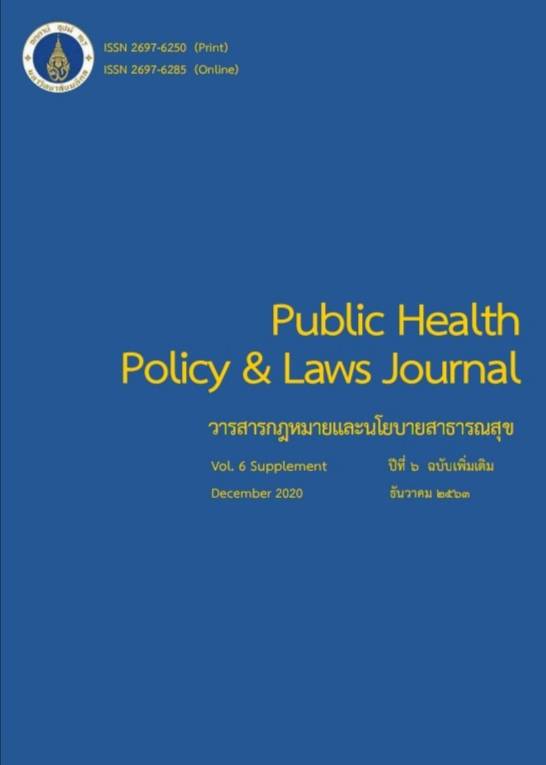Protection law on "Corona Virus" 2019 (Covid-19)
Keywords:
Protection law, Corona virus, Communicable Disease Act 2015Abstract
This paper aimed to study relevant laws related to law enforcement according to the Communicable Disease Act, 2558 B.E., which was implemented on March 1, 2020. Ministry of Public Health reported on cases of Novel Coronavirus (2019-nCoV) situation, as of January 31, 2020. This law was considered a law of international sanitation regulations (International Health Regulation: IHR), issued by the World Health Organization in 2005. The essence of this law is as followed: prescribing of monitoring measures, indicating role of central agencies to coordinate with the World Health Organization, measures on quarantine and detention, and sanitation measures relating to international travel by ships and aircraft.
Thailand reported on COVID-19 situation, as of 7 March 2020, with 31 confirmed patients who were cured, 18 were still hospitalized, and 1 death. Currently, there were 50 confirmed infected patients in Thailand, ranking 25th in the world. From January 3 - March 6, a total of 4,234 cases had to be monitored and investigated, with 175 confirmed cases from every checkpoint, and 4,059 cases came on their own to be treated at hospitals. The situation was likely to become an epidemic in Thailand.
The author compiled related laws, ministerial announcements, measures, and guidelines for resolving problems related to COVID-19, for the benefits of surveillance, prevention and control of dangerous communicable diseases, through cooperation, power of authorization, and social responsibility. Recommendations are: washing hands regularly with soap and water. or alcohol gel; avoiding of touching your eyes, nose, or mouth, unnecessarily with your hands; and strictly follow the precaution instructions of "Eating hot food, using your own spoon, wash your hands with soap, and keep physical distancing" strictly.
References
กองระบาดวิทยา กรมควบคุมโรค.(2563).สรุปเรื่องน่ารู้ กฎหมายคุ้มครอง ไวรัสโคโรน่า 2019. 2 มี.ค. 2020. สืบคนจาก https://news.mthai.com/general-news/795632.html
กรุงเทพธุรกิจ. (2563).เปิดข้อกฎหมาย หลัง 'โควิด-19' เป็นโรคติดต่ออันตราย. 1 มีนาคม 2563.
สืบค้นจาก https://www.bangkokbiznews.com/news/detail/868625
ไทยรัฐออนไลน์. (2563).สธ. เผยบทลงโทษ ผู้ป่วยปกปิดข้อมูล ป้องกันไวรัส "โควิด-19"ไทยรัฐออนไลน์.27 ก.พ. 2563. สืบคนจาก https://www.thairath.co.th/news/society/1781753
ประชาชาติธุรกิจ.(2563). “ระยะ 3” ของการแพร่ระบาดไวรัส “โควิด-19” เป็นอย่างไร.ในประเทศ.วันที่ 3 มีนาคม 2563. สืบคนจาก https://www.prachachat.net/general/news-427442
ประสิทธิ์ ปิวาวัฒนพานิช.(2563).ไวรัสโคโรน่ากับมาตรการทางกฎหมาย: ทางสองแพร่งระหว่าง Health or Wealth.ประชาไท. วันที่ 16 กุมภาพันธ์ 2563. สืบค้นจาก https://prachatai.com/journal/2020/02/86372#_ftnref9
ภาควิชาจุลชีววิทยา คณะแพทยศาสตร์ศิริราชพยาบาล มหาวิทยาลัยมหิดล.(2563).วรัสโคโรน่าสายพันธุ์ใหม่ 2019 (novel coronavirus 2019, 2019-nCoV). เข้าถึงเมื่อ 6 มีนาคม 2563. สืบค้นจาก https://www.si.mahidol.ac.th/th/healthdetail.asp?aid=1410
รัฐบาลไทย. (2563).ด้านเศรษฐกิจ.28 กุมภาพันธ์ 2563. สืบค้นจาก https://www.thaigov.go.th/news/contents/details/26820
ราชกิจจานุเบกษา.(2558). พระราชบัญญัติโรคติดต่อ พ.ศ. 2558 สืบค้นจาก
https://ddc.moph.go.th/uploads/ckeditor/c74d97b01eae257e44aa9d5bade97baf/files/001_1gcd.PDF
ราชกิจจานุเบกษา.(2563).ประกาศกระทรวงสาธารณสุขเรื่อง ชื่อและอาการสำคัญของโรคติดต่ออันตราย (ฉบับที่ 3) พ.ศ. 2563. วันที่ 29 กุมภาพันธ์ 2563. สืบค้นจาก http://www.ratchakitcha.soc.go.th/DATA/PDF/2563/E/048/T_0001.PDF
สํานักงานคณะกรรมการกฤษฎีกา. (2522). พ.ร.บ. คนต่างด้าว พ.ศ. 2522 มาตรา 12 (4) สืบค้นจาก http://web.krisdika.go.th/data/law/law2/%A402/%A402-20-9999-update.pdf
สุขภาพดีกับรามา.(2563).วิธีป้องกันไวรัสโคโรน่าสายพันธุ์ใหม่ 2019.ประชาชาติธุรกิจ.วันที่ 17 กุมภาพันธ์ 2563. สืบคนจาก https://www.prachachat.net/rama-health/news-422339.
Azernews. (2020). Azerbaijan temporarily bans import of some products from China. AzerNewsAz.29 January 2020. สืบค้นจาก https://www.azernews.az/business/161114.html
BBC. (2020). ไวรัสโคโรนา : เตรียมบังคับใช้กฎหมายโควิด-19 เป็นโรคติดต่ออันตราย ปกปิดข้อมูลมีโทษปรับ 20,000 บาท.27 กุมภาพันธ์ 2020. สืบค้นจาก https://www.bbc.com/thai/thailand-51656011
Oppenheim’s International Law. (2008). (edited by Sir Robert Jennings and Sir Arthur Watts), (USA: Oxford University Presss,2008), Vol 1: pp.987-988; Maurice Kamto, Preliminary report on the expulsion of aliens, DOCUMENT A/CN.4/554,2005, p.197
Siranush Ghazanchyan.(2020). Armenia bans import of animal products from China. Public Radio Of Armenia.January 26, 2020. สืบค้นจาก https://en.armradio.am/2020/01/26/armenia-bans-import-of-animal-products-from-china/
The Jakarta Post.(2020). Indonesia reviews Chinese imports restrictions over coronavirus concerns.Trade Minister Agus Suparmanto. (JP/Seto Wardhana). January 27, 2020. สืบค้นจาก https://www.thejakartapost.com/news/2020/01/27/indonesia-reviews-chinese-imports-restrictions-over-coronavirus-concerns.html
Downloads
Published
How to Cite
Issue
Section
License
Disclaimer and Copyright Notice
The content and information presented in articles published in the Journal of Law and Public Health Policy represent the opinions and sole responsibility of the respective authors. The editorial board does not necessarily agree with or assume any responsibility for the views expressed.
All articles, data, content, images, and other materials published in the Journal of Law and Public Health Policy are the intellectual property of the journal. Any individual or organization wishing to reproduce, distribute, or otherwise use the entirety or any part of such materials must provide proper citation.





